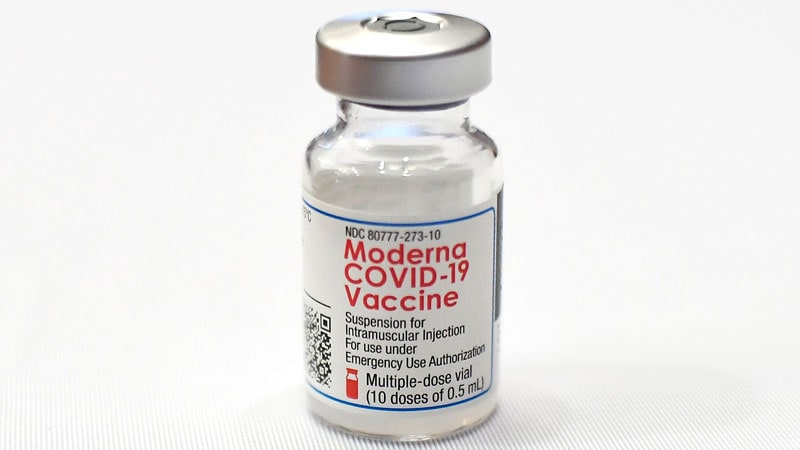Editor’s note: Find the latest COVID-19 news and guidance in Medscape’s Coronavirus Resource Center.
The recently authorized COVID-19 vaccine developed by Moderna and the National Institute of Allergy and Infectious Diseases (NIAID) was 94.1% effective in preventing symptomatic COVID-19, according to phase 3 trial results published December 30 in The New England Journal of Medicine.
No cases of severe COVID-19 occurred among participants who received the vaccine, known as mRNA-1273, and there were no safety concerns.
The US Food and Drug Administration on December 18 issued an emergency use authorization for the vaccine, a lipid-nanoparticle-encapsulated mRNA vaccine expressing the prefusion-stabilized spike glycoprotein.
The trial began in July and enrolled 30,420 adults in the United States. Volunteers were randomly assigned in a 1:1 ratio to receive either two doses of the vaccine or two shots of saline placebo 28 days apart. The average age of the participants was 51 years.
In all, 196 cases of symptomatic COVID-19 occurred at least 14 days after participants received their second shot — 185 cases in the placebo group, and 11 in the vaccine group.
In a secondary analysis that included cases that occurred at least 14 days after the first shot, vaccine efficacy was 95.2%, study author Lindsey R. Baden, MD, of Brigham and Women’s Hospital, Boston, Massachusetts, and colleagues report.
About half of the participants who received mRNA-1273 experienced moderate to severe side effects, such as fatigue, muscle aches, joint pain, and headache, after the second dose. Most adverse events resolved within 20 days.
Future Studies
Future studies will assess the vaccine’s effect on infectiousness.
Both the Moderna vaccine and the Pfizer-BioNTech vaccine “begin to protect recipients approximately 10 days after the first dose, with maximum protection after the second dose,” said Barton F. Haynes, MD, in an accompanying editorial.
That both have “near-identical 94% to 95% vaccine efficacies — and that both vaccines were developed and tested in less than a year — are extraordinary scientific and medical triumphs,” said Haynes, director of the Duke Human Vaccine Institute, Durham, North Carolina.
“mRNA technology has the potential to radically change vaccine design for future viral outbreaks,” he said.
Continued safety monitoring and analysis of virus escape from protective immune responses will be important, Haynes added.
Subgroup analyses by age, sex, race/ethnicity, and risk for severe COVID-19 showed “maintenance of efficacy across the board,” tweeted Medscape Editor-in-Chief Eric Topol, MD, leader of the Scripps Translational Science Institute in La Jolla, California.
Subgroup analysis, maintenance of efficacy across the board pic.twitter.com/SbxeQMTYRz
— Eric Topol (@EricTopol) December 30, 2020
Topol highlighted the absence of severe COVID-19 among participants who received the vaccine. All 30 participants in the trial who developed severe COVID-19 were in the placebo group. One death among those participants was attributed to COVID-19.
The study was supported by the Biomedical Advanced Research and Development Authority and the NIAID. Baden is a deputy editor at the The New England Journal of Medicine and received NIH grants during the study. Baden collaborates with federal agencies, companies, and foundations on HIV and COVID-19 vaccine clinical trials. Some study coauthors are employees of Moderna or disclosed ties to pharmaceutical companies or grants from foundations and federal agencies. Haynes owned Moderna stock at one point during the past year, has received grants from the NIH outside the submitted work, and has patents pending related to COVID-19 vaccine development. He has collaborated with Baden on HIV vaccine research projects.
N Engl J Med. Published online December 30, 2020. Full text
For more news, follow Medscape on Facebook, Twitter, Instagram, and YouTube.
